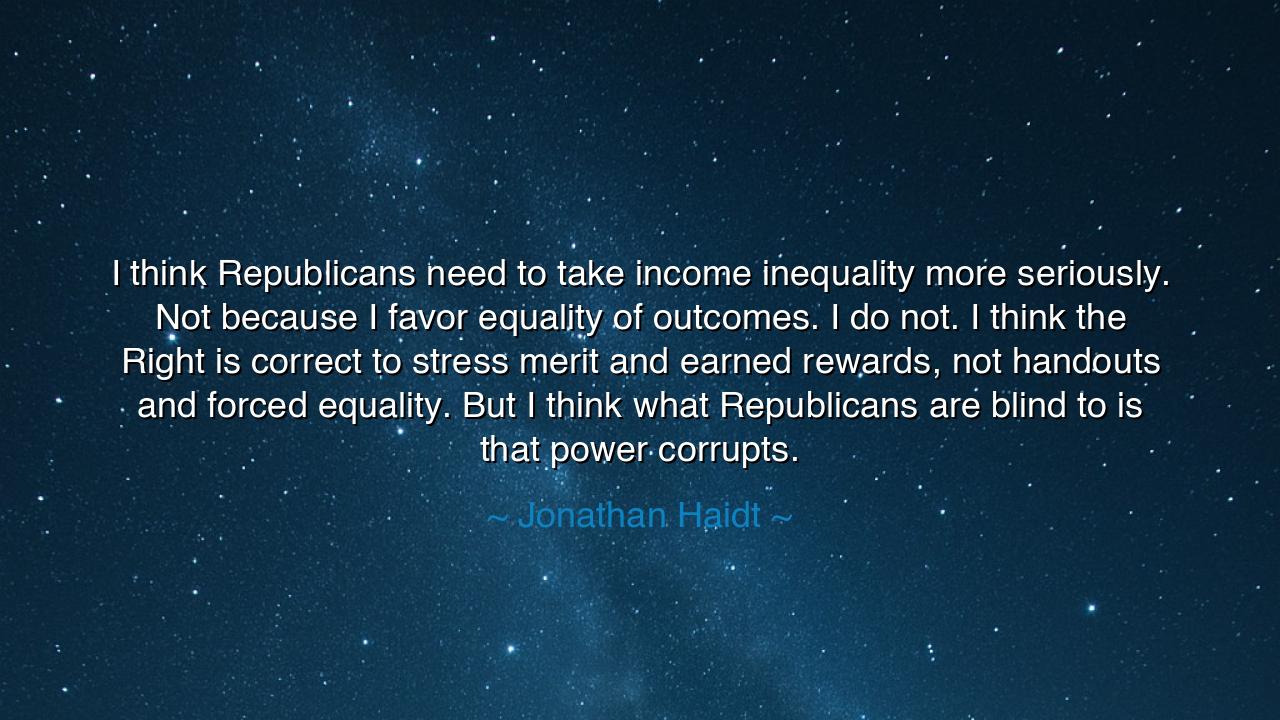
I think Republicans need to take income inequality more
I think Republicans need to take income inequality more seriously. Not because I favor equality of outcomes. I do not. I think the Right is correct to stress merit and earned rewards, not handouts and forced equality. But I think what Republicans are blind to is that power corrupts.






The words of Jonathan Haidt, “I think Republicans need to take income inequality more seriously. Not because I favor equality of outcomes. I do not. I think the Right is correct to stress merit and earned rewards, not handouts and forced equality. But I think what Republicans are blind to is that power corrupts,” are a call to wisdom in an age of imbalance. They are not a cry for revolution, but a plea for reflection — a reminder that virtue lies not in ideology, but in balance. In these words, Haidt speaks as the ancients once did, warning that when wealth becomes too concentrated and unchecked, power hardens into tyranny, and the soul of a nation begins to decay. His voice echoes through time, joining those who have always understood that justice is not born from equality alone, but from vigilance against the corrupting nature of privilege.
To grasp the depth of his message, we must first understand Haidt himself — a moral psychologist who studies how values shape societies and divide nations. His wisdom flows from observation, not dogma. When he says he does not “favor equality of outcomes,” he affirms the timeless principle of merit, the belief that effort and excellence should be rewarded. This is a noble truth: without it, ambition dies, and civilization stagnates. Yet Haidt reminds us that the virtue of merit, when unbalanced, can become cruelty. For when the ladder of success grows too steep, when those who climb forget to strengthen the rungs below them, the world divides not by ability but by access — and those at the summit begin to believe they are gods, not men.
The ancients knew this peril well. Plato, in The Republic, warned that every society drifts toward corruption when the guardians of the city cease to care for the whole. Wealth, when joined to arrogance, breeds decay; poverty, when joined to resentment, breeds revolt. And between these two, the harmony of the state is lost. Haidt’s words carry this same ancient truth into our modern world: that the corruption of the powerful is not always born of evil intent, but of blindness — the slow, creeping conviction that success is always deserved and suffering always earned. This blindness, he says, is what the Right must guard against.
We have seen this lesson written in the pages of history. Consider the fall of Rome, whose mighty empire crumbled not by sword, but by rot from within. Its elites grew distant from its people, surrounded by luxury yet empty of duty. They spoke of merit and divine favor, but forgot compassion and restraint. The philosopher Seneca, himself among the wealthy, wrote, “No man confines his greed; the rich seek to grow richer.” Rome’s glory turned to dust not because it failed in power, but because it failed in humility. So too, Haidt warns, any society that forgets its moral limits — that prizes wealth without wisdom, merit without mercy — will find that power corrupts as surely as rust eats iron.
And yet Haidt’s words are not cynical; they are a call to renewal. He does not reject merit, nor condemn prosperity. Instead, he urges that those who rise must look back — not with guilt, but with guardianship. For in the great balance of civilization, those who hold power must remember that they are stewards, not masters. The ancient kings of Mesopotamia took oaths to uphold “justice for the weak and the widow.” The prophets of Israel cried out against the arrogance of the mighty, saying that wealth without compassion invites the judgment of heaven. Haidt’s teaching, though secular in tone, stands firmly within this sacred lineage: the belief that strength without conscience is a form of blindness, and that wisdom begins with the recognition of human frailty.
The rhythm of his thought is the rhythm of the Golden Mean, that ancient principle which Aristotle called the path of virtue between extremes. Too much inequality breeds tyranny of wealth; too much enforced equality breeds tyranny of the state. The wise walk the middle way — rewarding effort, but remembering mercy; defending freedom, but restraining greed. In this balance lies the stability of nations and the dignity of man. To forget it is to invite chaos, for the forces of envy and arrogance are equal destroyers, both born of the same root: blindness to the shared destiny of humankind.
Let this, then, be the lesson of Jonathan Haidt’s reflection: that the true enemy of civilization is not inequality itself, but the corruption of the heart that arises when those with power cease to see those without it. Whether one rules a nation, a business, or a household, the same truth applies — that power must be tempered by humility, and success by gratitude. The ancients would say, “He who rules without listening soon rules alone.” So too today, the call of wisdom remains unchanged: listen to the suffering of others, guard your heart against pride, and remember always that merit is noble only when it serves the common good. For as Haidt warns, and as time has proven, power corrupts — but awareness of that corruption is the beginning of virtue, and the rebirth of justice.






AAdministratorAdministrator
Welcome, honored guests. Please leave a comment, we will respond soon